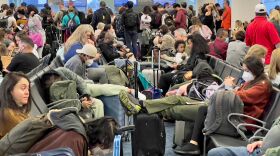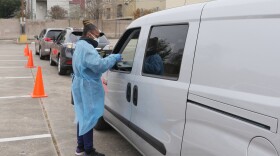-
Updated COVID boosters are now available for anyone age 12 or older. The CDC is urging anyone who is eligible to sign up but some vaccine experts say some people might want to wait.
-
The Biden administration is scrapping plans to offer COVID boosters for people under 50 this summer. Instead officials will push for an earlier release of the next generation boosters in the fall.
-
CDC advisers are recommending the use of two separate COVID-19 vaccines for the youngest children made by Moderna and Pfizer-BioNTech, paving the way for vaccine rollout as early as next week.
-
A committee of experts voted unanimously to recommend that the Food and Drug Administration authorize COVID-19 vaccines from Moderna and Pfizer-BioNTech for children as young as 6-months-old.
-
Fauci, the chief medical adviser to President Biden and director of the National Institute of Allergy and Infectious Diseases, tested positive on a rapid antigen test.
-
At least 1 million people have died in the U.S. from COVID-19. NPR's Songs of Remembrance project shares some of their stories and the music they loved.
-
Households in the U.S. will receive eight test kits via the U.S. Postal Service. The release comes as cases have risen over 60% in the U.S. over the past two weeks.
-
Vaccinations and residual immunity are among the reasons, President Biden's chief medical adviser, Anthony Fauci, said Tuesday, as the number of deaths drop and hospitalizations rise only slightly.
-
So many people caught the omicron variant over the winter that almost 60% of everyone in the U.S. — including most children — now have antibodies to the virus in their blood, the CDC said Tuesday.
-
Vice President Harris has tested positive for COVID-19 and has exhibited no symptoms, the White House announced on Tuesday. She's not considered a close contact to President Biden or the first lady.
-
The WHO and the Biden administration extended the public health emergency for COVID-19, saying the virus is still considered a serious health threat.
-
U.S. employers added 431,000 jobs in March, as the unemployment rate fell to 3.6% from 3.8% in February. The tight job market is putting upward pressure on both wages and prices.















